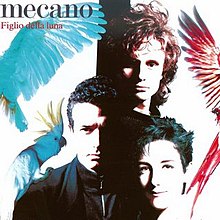Descanso Dominical
| Descanso Dominical | ||||
|---|---|---|---|---|
 |
||||
| Studio album by Mecano | ||||
| Released | 1988 (Spain) | |||
| Genre | Pop | |||
| Label | Ariola Eurodisc S.A. | |||
| Producer | Mecano | |||
| Mecano chronology | ||||
|
||||

Figlio Della Luna
Italian Edition Cover – 1989 |
||||

Descanso Dominical
French Edition Cover – 1990 |
||||
| Professional ratings | |
|---|---|
| Review scores | |
| Source | Rating |
| Allmusic | |
Descanso Dominical (English: Sunday Break) is an album by pop group Mecano. It was released in 1988. This was the album that reaffirmed their stardom as worldwide artists. It was their second release with Ariola Records. Before its release, this album was intended to be a 2-disc album due to the large amount of material, but that intent was cancelled.
This album was well received by the critics in general; it was categorized as the best release from this group. It has sold 2.3 million copies in Spain alone. The songs, such as "La fuerza del destino" (The power of fate) and "Mujer contra mujer" (Woman against woman) topped the charts all over Latin America and Spain.
"Mujer contra mujer" has versions in French and Italian, which also reached No. 1 in France and Italy; it was also an overwhelming hit in Latin America, and most remarkably in the cases of Chile, Cuba, Ecuador, Puerto Rico and Nicaragua, where homosexuality was punished in their laws at that time. Also, in Mexico the song was banned at the beginning of its promotion, but the success of the song helped to revoke the ban.
Since the very first day of its launch, "Mujer contra mujer" caused scandal and polemic; among other things, the Catholic Church threatened to excommunicate the members of the group, inasmuch as the topic of the song was considered lascivious. The video of the song also had problems of censorship; for example, in the Dominican Republic it was prohibited according to the laws of entertainment, which ban any video related to homosexuality or bisexuality. However, it was a resounding hit that was demanded by viewers all over Latin America.
"Mujer contra mujer" has been a source of inspiration for other singers and groups like Rammstein who composed a song titled "Mann gegen Mann" (Man against man) included in the album Rosenrot, also Franco De Vita based his song "Rosa y clavel" (Rose and carnation) on this song. It is considered one of the first gay anthems in Spanish.
The Italian edition was retitled "Figlio della Luna". This album has eight tracks from the Spain edition and two tracks from Entre El Cielo y El Suelo, all re-written in Italian, except for "Por La Cara," which is instrumental. It was the first album that Mecano recorded in a language other than Spanish, and the only one that didn't include any song in Spanish. All the songs were adapted in Italian by M. Luberti. "Mi costa tanto scordarti" (It's hard for me to forget you,) was also recorded, but it was taken out of the final selection. The album itself didn't meet sales expectations in Italy despite the success of the tracks.
...
Wikipedia
